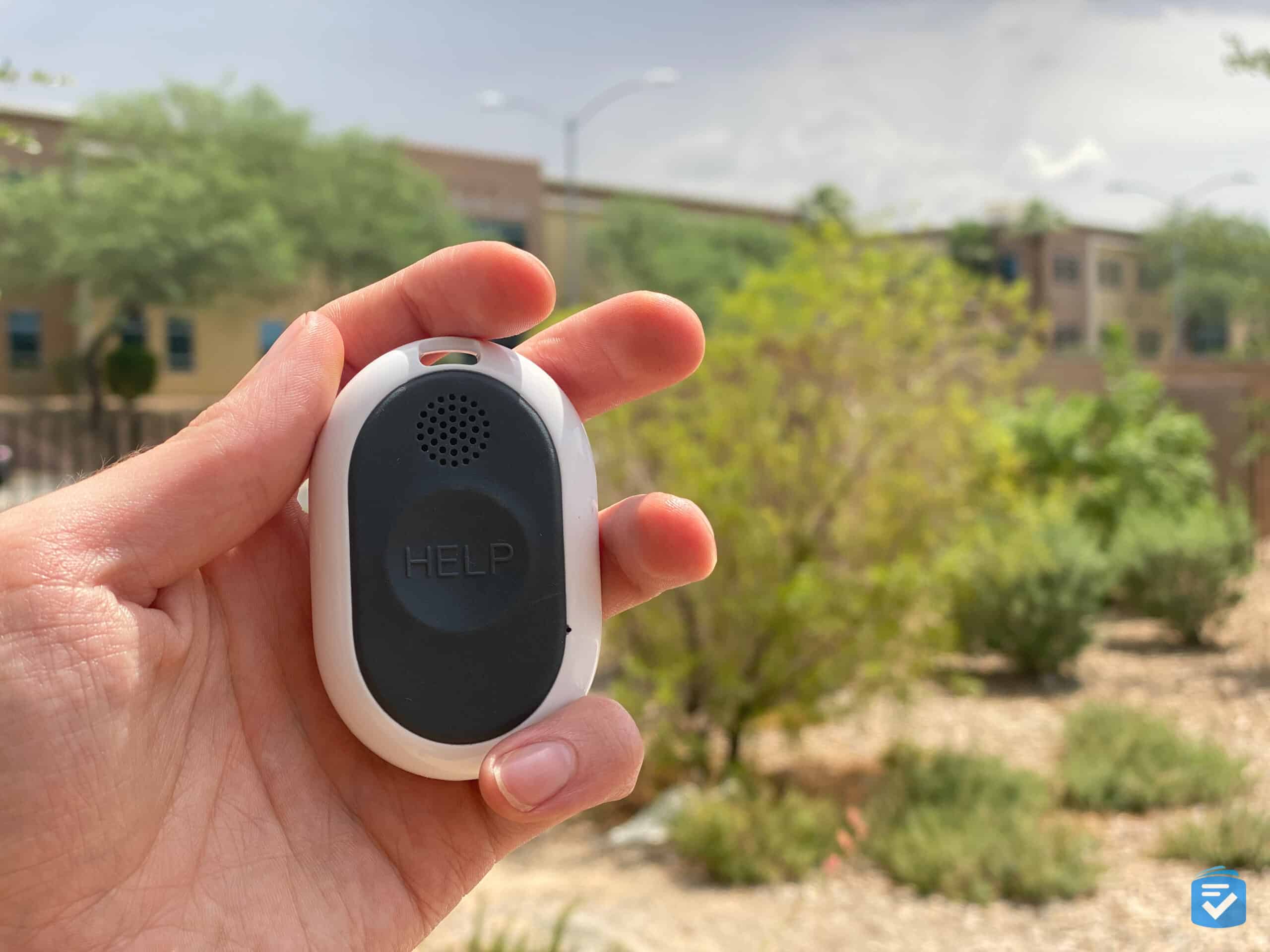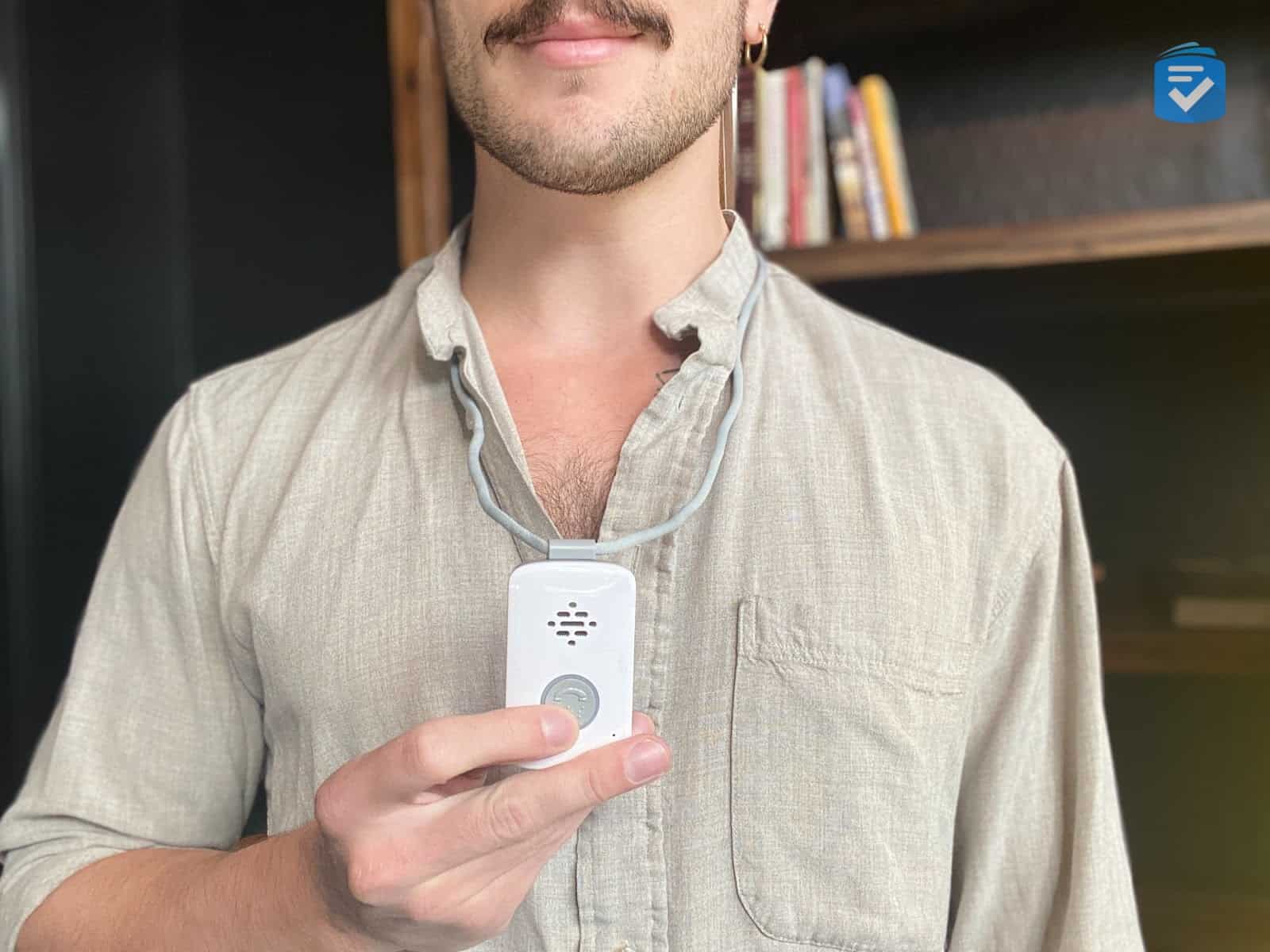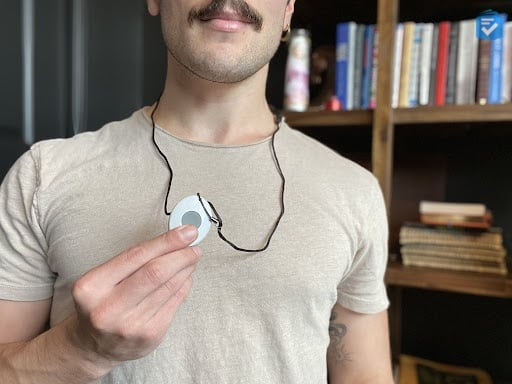The 3 Best Medical Alert Necklaces of 2024

Overall Rating:
View Packages855-675-0754
Overall Rating:
View Packages877-947-4512
Overall Rating:
View Packages800-915-8738
For those who live alone, a medical alert necklace provides quick access to emergency assistance. Worn around the neck, these devices go wherever the user goes. This allows the user to press a button and contact response agents who can coordinate a response — whether that means calling EMTs or a neighbor for help.
In this list of the best medical alert necklaces for seniors, we’ve tested out dozens of different devices and ranked them based on price, performance, and reliability.
Pro Tip: Looking for a bracelet, smartwatch, or GPS medical alert? Then read our guide to this year’s overall best medical alert systems.
The 3 Best Medical Alert Necklaces
- Bay Alarm Medical : Mobile and In-Home Necklaces
- Medical Guardian : Fastest Response Times
- MobileHelp : Most Affordable Necklace
Top Picks for the Best Medical Alert Necklaces
1. Bay Alarm Medical - Mobile and In-Home Necklaces
What We Like Most:
- Systems from $24.95 per month
- No long-term contracts
- Free app for caregivers
- One-month trial period
Overview
Whether you’re looking for a mobile or home system, Bay Alarm Medical has necklace options to suit any type of user. Their prices start at $24.95 per month, and they require no long-term contracts.

Testing
Bay Alarm Medical really impressed us with its dispatchers’ response times. Across all its systems, we found that we were connected to help in an average of 16 seconds — much lower than the industry average of 30 seconds. Plus, it’s far quicker than Life Alert, which averaged 120 seconds.
In terms of necklaces, we particularly liked the SOS Mobile. This system features a speakerphone, GPS, and fall detection all in one compact unit. We had the option of wearing it around the neck or on the included belt clip.
Its SOS home system has a range of 1,000 feet, while its SOS mobile and smartwatch versions have an unlimited range. The home system comes with a landline or cellular option, and the necklace itself has a five-year battery life. We like that all its devices are waterproof and can even be customized to look like jewelry for users who may need a little convincing to wear a medical device.
>>Read More: SOS Smartwatch Review
Pricing
Bay Alarm Medical’s systems start at $24.95 per month for the in-home landline system. The cellular in-home system costs $29.95 per month. Mobile systems will cost a bit more at $34.95 per month. Overall, these prices are about average for the industry. Luckily, the provider requires no long-term contracts. When we finished testing our systems, we sent them back and stopped making monthly payments.
To learn more about the different systems from Bay Alarm, read our full rundown of Bay Alarm Medical costs.
Drawbacks
As for downsides, we noted that most of the company’s products come with a one-time equipment fee between $30 and $160, depending on the system. If you’re looking to avoid activation fees, then we’d recommend MobileHelp.
Our Verdict
Bay Alarm Medical offers a range of plan options, including at-home and on-the-go devices. Its plans start at $24.95 per month and come with free GPS tracking, support for over 10 languages, and no long-term contracts.
To learn more about this provider, read our full review of Bay Alarm Medical.
Pros
- Quick response times
- Affordable prices
- Free GPS tracking
- Comfortable wearables
Cons
- Installation and device fees
- Extra warranty charge
2. Medical Guardian - Fastest Response Times
What We Like Most:
- Built-in fall detection
- Well-rated monitoring center
- Decent pricing
- Home and mobile GPS options
Overview
In terms of medical alert necklaces, no company connected us to help faster than Medical Guardian, averaging eight seconds across our 10 test calls.

Testing
It’s hard to go wrong with Medical Guardian’s lineup of systems. Whether you choose a mobile pendant or one of their in-home systems, you’ll get lightning-fast response times from their monitoring center.
In particular, we were impressed by the MGMini. This mobile medical alert features built-in fall detection, as well as GPS and speakerphone. Wherever we went, not only could monitoring agents track our location, but loved ones could also check on it by using the MyGuardian app. Through this app, loved ones could also receive notifications each time we pressed our help button.
Additionally, all of Medical Guardian’s help buttons are water-resistant. When we took them into the shower, a frequent site of falls, they were able to function normally.
Pricing
Medical Guardian systems start at $29.95 per month for their landline system and $37.95 for their home cellular device. Mobile systems like the MGMini cost $44.95 per month. Overall, Medical Guardian’s prices are higher than average; however, we think the extra price is worth it for the fast response times.
To learn more about its pricing and contracts, read our full rundown of Medical Guardian costs.
Drawbacks
The only drawback of Medical Guardian would have to be its costs. No matter which system you choose, it’s going to cost you more than the comparable systems from MobileHelp and Bay Alarm. On the plus side, Medical Guardian does not lock you into long-term contracts.
Our Verdict
With reliable equipment and ultra-fast response times, Medical Guardian has some of our favorite medical alert necklaces. To learn more about our experience with Medical Guardian, read our full Medical Guardian review.
Pros
- In-home and mobile options
- Accurate fall detection
- Location tracking
- Useful features for caregivers
Cons
- Higher costs
- Not all devices offer fall detection
3. MobileHelp - Most Affordable Necklace
What We Like Most:
- No hidden fees
- Plenty of device options
- Frequent sales
- Fast response time
Overview
Starting at $19.95 per month, MobileHelp has the most affordable home medical alert system we’ve seen. Despite the low prices, this company’s devices are highly reliable.

Testing
Across all of the MobileHelp systems, we found consistently quick response times: We averaged 26 seconds in our test calls. While this is a bit longer than the times of other systems on this list, it’s still a pretty respectable response time.
Elsewhere, with MobileHelp’s necklaces, we were pleased that they’re both comfortable to wear and water-resistant. When we dropped them or placed them in a bowl of water, the buttons incurred no damage.
Pricing
MobileHelp offers medical alert devices priced widely between $19.95 and $64.95. These include three at-home systems, two completely mobile ones, and three bundle deals. We like how the company doesn’t nickel and dime their customers like some other brands; they give you a month-long free trial of the MobileHelp system and waive any activation, service, or equipment fees when you get started. Fall detection will cost $11 per month, as opposed to the standard $10, but we’re willing to write this off.
To learn more about the different systems and their costs, read our guide to MobileHelp pricing.
Drawbacks
The biggest downside of MobileHelp systems would have to be its limited features for caregivers. While loved ones can receive text alerts when a user presses their help button, there is no live GPS tracking, as with Bay Alarm and Medical Guardian.
Our Verdict
Affordably priced with relatively quick response times, MobileHelp is our top budget pick for medical alert necklaces. To learn more about our experience with this provider, read our full MobileHelp review.
Pros
- Great prices and sales
- Plenty of mobile and at-home options
- Excellent response time
- No hidden fees
Cons
- Slightly higher fall detection cost
- Paid warranty
Why Life Alert Didn’t Make the List
Life Alert is without a doubt the most well-known brand in medical alert systems; however, after purchasing their systems and testing them out, we were horrified at how long we had to wait to be connected to help.
Across our 10 test calls with Life Alert, we found that we waited an average of 120 seconds. Yes, you read that correctly: two whole minutes until a response agent picked up the call. This is unacceptable, and we hate to think of all the people who have tried to call for help with their Life Alert systems but were subjected to such long times. Read our full Life Alert review to learn more about our experience with the brand.
As if these slow response times were not enough, Life Alert also charges high costs for its unreliable service. Life Alert costs range from $49.95 to $89.95 per month. On top of this, Life Alert requires a three-year contract, meaning that we’ll be stuck paying our $89.95 monthly charge for the next couple of years. This contract can only be exited by death or transition to round-the-clock care.
Our Methodology
| Companies evaluated | 20 |
| Hours of research | 100+ |
| Hours of product testing | 150+ |
| Finalists chosen | 3 |
- Pricing: While medical alert necklaces can save your life, they may also charge you for extra features or lock you into long-term contracts. We took into account the value you get for the fees when comparing these products.
- Comfort: Since a medical alert necklace needs to be worn, it should be comfortable. You want your loved one to keep it on, so we chose the products for comfort as well as functionality.
- Response time: There would be little point investing in a medical alert necklace with a slow response time. We tested each necklace’s response time to ensure that the monitoring system is solid — in the event that the necklace is needed to save your or your loved one’s life.
- Range: Medical alert necklaces require a connection to a wireless phone network or a hardwired connection to a landline to work — usually through a box placed in the user’s home. The range of the device determines how far away the user can be in their home or yard and still have a stable signal.
What Is a Medical Alert Necklace?
A type of medical alert device, a medical alert necklace provides access to emergency response agents. Worn around the neck, the medical alert necklace will have a button. When pressed, this button will place a call to the device’s monitoring center. In most cases, these calls will be carried out through a system’s base unit. This base unit will have a speakerphone, allowing the response agent and the user to communicate.
The efficacy of a medical alert necklace is in its wearability. While a cell phone could certainly be used to contact emergency services, it cannot be taken everywhere. For example, a majority of falls occur in the bathroom. Most medical alert necklaces, however, are water-resistant; this allows the user to take them wherever they go.
Mobile vs. In-Home Medical Alert Necklaces
Most medical alert companies offer in-home necklaces as well as mobile versions that can be used when you leave the house. Some brands, such as MobileHelp, offer systems that work both ways.
While mobile systems can be easily used in the home, mobile units tend to be difficult to carry around due to their bulk and frequent need to be charged. Anyone who lives alone, has a high risk of falling, or suffers from a chronic condition that could cause a medical emergency could benefit from using an at-home system.
While a mobile system could help anyone when they’re on the go, you should compare your risk of having a life-threatening medical event with the inconvenience of carrying one around to determine whether the bigger system is necessary.
To learn more about mobile systems, read our rundown of the best GPS-enabled medical alert systems.
Bottom Line
Medical alert necklaces do save people’s lives. But the systems can be pricey, and not everyone is happy with having a communication device on them 24/7. Mobile systems can also be cumbersome to bring with you.
If you or a loved one is at an elevated risk for a medical emergency, especially while living alone, a medical alert necklace can provide the peace of mind to know that help is available if something happens.
Frequently Asked Questions
-
Which medical alert necklace is best?
The best devices we reviewed overall were the Bay Alarm Medical necklaces due to their low prices and ease of use. However, all the devices listed here have positives that could make them the ideal choice for your or your loved one’s needs.
-
Does fall detection require an additional necklace?
Some companies offer fall detection built into their at-home or mobile devices, while others require additional devices with additional charges. The industry-average cost for fall detection is $10 per month.
-
How do you get a medical alert necklace?
Some hospitals, local senior agencies, and foundations offer medical alert devices to seniors at a discount. Otherwise, you can contact the companies directly to find out if they have any special offers available. Sometimes, you can get deals not otherwise offered through their online sign-up process.





